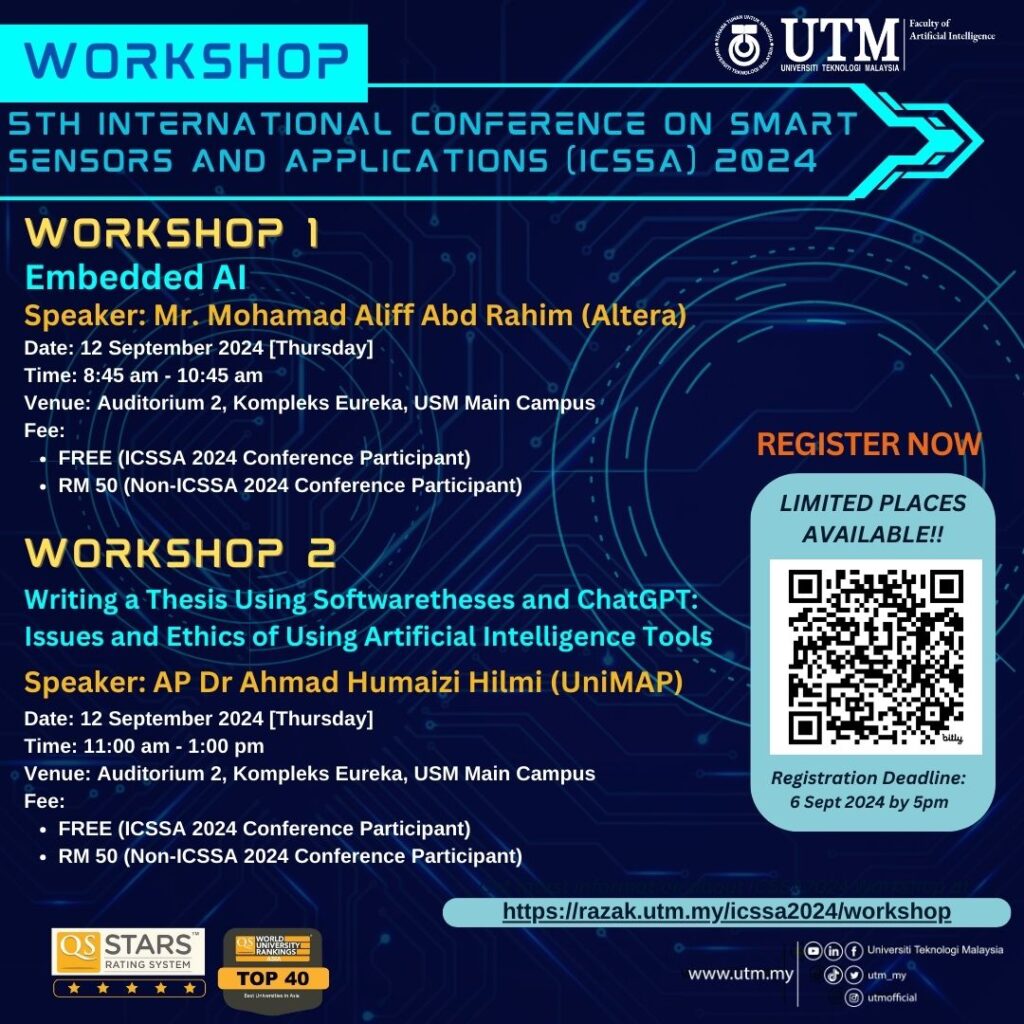Workshop

Workshop 1
Title: Embedded AI
Speaker: Mr. Mohamad Aliff Abd Rahim (Altera)

Biography of Speaker:
Mr. Aliff is an experienced Software and Firmware Engineer with a demonstrated history of working in the semiconductors industry. He is Skilled in C, Web Development, C++, C#, and BIOS/UEFI. Mr Aliff graduated from Universiti Malaysia Perlis, with a Bachelor of Biomedical Electronic Engineering (Honours).
Synopsis of Workshop:
As Artificial Intelligence (AI) continues to revolutionize industries, its integration into embedded systems is opening new frontiers in technology. This talk will explore how Embedded AI is transforming everyday devices into intelligent systems, capable of real-time decision-making, predictive analysis, and adaptive learning. Unlike traditional AI systems that depend on cloud computing, embedded AI allows devices to process data and make decisions locally, enhancing their functionality and responsiveness.
We’ll start with the introduction of embedded AI and its evolution, from resource-intensive AI systems to modern, compact devices. Key topics will include;
- Applications range from Consumer Electronics: Smart devices like voice assistants that process commands and control home systems, Healthcare: Wearable devices that monitor health metrics in real-time and provide critical insights, and Automotive: Vehicles equipped with AI systems for enhanced safety and driving assistance.
- The benefits of embedded AI include; real-time processing, cost efficiency, and improved reliability. However, challenges such as resource limitations, security concerns, and ethical issues must also be addressed.
- Sample of a demo at the end session (TBC)
In conclusion, embedded AI will benefit our present and future, making everyday devices smarter and more intuitive. Will emphasizes the impact of this technology on various industries and our daily lives. This talk is for engineers, developers, and researchers looking to stay ahead in the rapidly advancing field of AI.
Workshop 2
Title: Writing a Thesis Using Softwaretheses and ChatGPT: Issues and Ethics of Using Artificial Intelligence Tools
Speaker: Assoc. Prof. Dr Ahmad Humaizi bin Hilmi (UniMAP)

Biography of Speaker:
Assoc. Prof. Dr. Ahmad Humaizi is an Associate Professor at the Faculty of Mechanical Engineering and Technology (FKTM) UniMAP, where he has worked since 2014. He holds a PhD in Defense Technology from Universiti Pertahanan Nasional Malaysia, a Master of Engineering in Mechanical (Advanced Manufacturing Technology) from Universiti Teknologi Malaysia (UTM), and a Bachelor of Engineering (Manufacturing with Management) from Universiti Sains Malaysia. He is a graduate member of the Board of Engineers Malaysia (BEM). His areas of interest include explosive simulation, explosive engineering, product development, machine component design, and mechanics of materials. He has conducted undergraduate and postgraduate courses in manufacturing, engineering, and product design and has supervised final year students in manufacturing engineering and product design engineering. Assoc. Prof. Dr. Humaizi and his brother Mr. Ahmad Zaim are the founder and creator of Softwaretheses, that is the software that can help postgraduates and researchers writing their thesis contents.
Synopsis of Workshop:
This workshop will demonstrate the capabilities of Softwaretheses in extracting content from selected journals uploaded by a user. The content generated by Softwaretheses includes complete references and is related to the keywords provided by the user. ChatGPT is currently the most powerful AI tool for writing thesis content. Its main advantage is its ability to help write content in long paragraphs. However, most users are not familiar with proper prompts, leading to overly complex and unrealistic writing for average non-English writers. There are also hallucination issues generated by ChatGPT, meaning it can create non-existent journals and facts. This workshop will introduce some basic prompts to ensure the quality of writing can pass plagiarism tests. The speaker will also address common ethical issues that arise when students submit their work.
